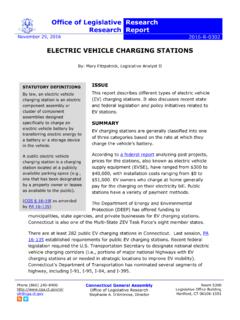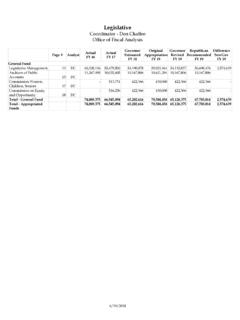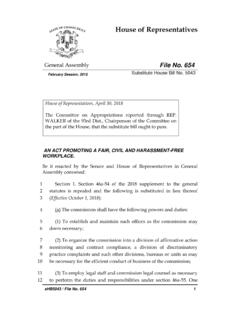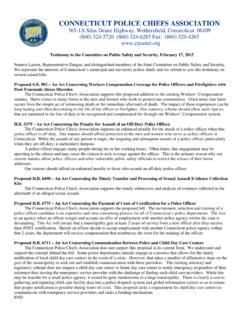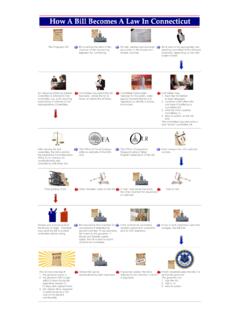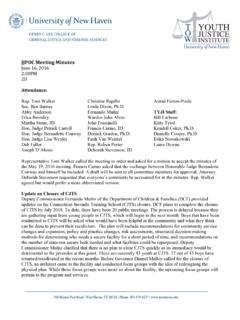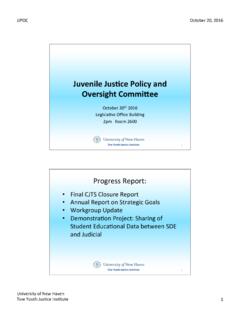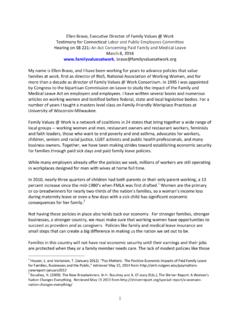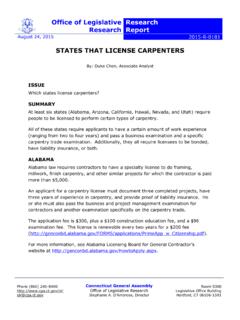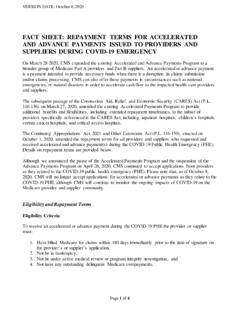Transcription of Public Act No. 21-69
1 Senate Bill No. 56. Public Act No. 21-69 . AN ACT DETERRING AGE DISCRIMINATION IN EMPLOYMENT. APPLICATIONS. Be it enacted by the Senate and House of Representatives in General Assembly convened: Section 1. Section 46a-60 of the general statutes is repealed and the following is substituted in lieu thereof (Effective October 1, 2021): (a) As used in this section: (1) "Pregnancy" means pregnancy, childbirth or a related condition, including, but not limited to, lactation;. (2) "Reasonable accommodation" means, but [shall not be] is not limited to, being permitted to sit while working, more frequent or longer breaks, periodic rest, assistance with manual labor, job restructuring, light duty assignments, modified work schedules, temporary transfers to less strenuous or hazardous work, time off to recover from childbirth or break time and appropriate facilities for expressing breast milk; and (3) "Undue hardship " means an action requiring significant difficulty or expense when considered in light of factors such as (A) the nature and cost of the accommodation.
2 (B) the overall financial resources of the employer; (C) the overall size of the business of the employer with respect to the number of employees, and the number, type and location Senate Bill No. 56. of its facilities; and (D) the effect on expenses and resources or the impact otherwise of such accommodation upon the operation of the employer. (b) It shall be a discriminatory practice in violation of this section: (1) For an employer, by the employer or the employer's agent, except in the case of a bona fide occupational qualification or need, to refuse to hire or employ or to bar or to discharge from employment any individual or to discriminate against [such]
3 Any individual in compensation or in terms, conditions or privileges of employment because of the individual's race, color, religious creed, age, sex, gender identity or expression, marital status, national origin, ancestry, present or past history of mental disability, intellectual disability, learning disability, physical disability, including, but not limited to, blindness or status as a veteran;. (2) For any employment agency, except in the case of a bona fide occupational qualification or need, to fail or refuse to classify properly or refer for employment or otherwise to discriminate against any individual because of such individual's race, color, religious creed, age, sex, gender identity or expression, marital status, national origin, ancestry, present or past history of mental disability, intellectual disability, learning disability, physical disability, including, but not limited to, blindness or status as a veteran.
4 (3) For a labor organization, because of the race, color, religious creed, age, sex, gender identity or expression, marital status, national origin, ancestry, present or past history of mental disability, intellectual disability, learning disability, physical disability, including, but not limited to, blindness or status as a veteran of any individual to exclude from full membership rights or to expel from its membership such individual or to discriminate in any way against any of its members or against any employer or any individual employed by an employer, Public Act No. 21-69 2 of 9. Senate Bill No. 56. unless such action is based on a bona fide occupational qualification.
5 (4) For any person, employer, labor organization or employment agency to discharge, expel or otherwise discriminate against any person because such person has opposed any discriminatory employment practice or because such person has filed a complaint or testified or assisted in any proceeding under section 46a-82, 46a-83 or 46a-84;. (5) For any person, whether an employer or an employee or not, to aid, abet, incite, compel or coerce the doing of any act declared to be a discriminatory employment practice or to attempt to do so;. (6) For any person, employer, employment agency or labor organization, except in the case of a bona fide occupational qualification or need, to advertise employment opportunities in such a manner as to restrict such employment so as to discriminate against individuals because of their race, color, religious creed, age, sex, gender identity or expression, marital status, national origin, ancestry, present or past history of mental disability, intellectual disability, learning disability, physical disability, including, but not limited to, blindness or status as a veteran.
6 (7) For an employer, by the employer or the employer's agent: (A) To terminate a woman's employment because of her pregnancy; (B) to refuse to grant to that employee a reasonable leave of absence for disability resulting from her pregnancy; (C) to deny to that employee, who is disabled as a result of pregnancy, any compensation to which she is entitled as a result of the accumulation of disability or leave benefits accrued pursuant to plans maintained by the employer; (D) to fail or refuse to reinstate the employee to her original job or to an equivalent position with equivalent pay and accumulated seniority, retirement, fringe benefits and other service credits upon her signifying her intent to return unless, in the case of a private employer, the employer's circumstances have so changed as to make it impossible or Public Act No.
7 21-69 3 of 9. Senate Bill No. 56. unreasonable to do so; (E) to limit, segregate or classify the employee in a way that would deprive her of employment opportunities due to her pregnancy; (F) to discriminate against an employee or person seeking employment on the basis of her pregnancy in the terms or conditions of her employment; (G) to fail or refuse to make a reasonable accommodation for an employee or person seeking employment due to her pregnancy, unless the employer can demonstrate that such accommodation would impose an undue hardship on such employer;. (H) to deny employment opportunities to an employee or person seeking employment if such denial is due to the employee's request for a reasonable accommodation due to her pregnancy; (I) to force an employee or person seeking employment affected by pregnancy to accept a reasonable accommodation if such employee or person seeking employment (i) does not have a known limitation related to her pregnancy, or (ii) does not require a reasonable accommodation to perform the essential duties related to her employment; (J) to require an employee to take a leave of absence if a reasonable accommodation can be provided in lieu of such leave.
8 And (K) to retaliate against an employee in the terms, conditions or privileges of her employment based upon such employee's request for a reasonable accommodation;. (8) For an employer, by the employer or the employer's agent, for an employment agency, by itself or its agent, or for any labor organization, by itself or its agent, to harass any employee, person seeking employment or member on the basis of sex or gender identity or expression. If an employer takes immediate corrective action in response to an employee's claim of sexual harassment, such corrective action shall not modify the conditions of employment of the employee making the claim of sexual harassment unless such employee agrees, in writing, to any modification in the conditions of employment.
9 "Corrective action" taken by an employer, includes, but is not limited to, employee relocation, assigning an employee to a different work schedule or other substantive changes to an employee's terms and Public Act No. 21-69 4 of 9. Senate Bill No. 56. conditions of employment. Notwithstanding an employer's failure to obtain a written agreement from an employee concerning a modification in the conditions of employment, the commission may find that corrective action taken by an employer was reasonable and not of detriment to the complainant based on the evidence presented to the commission by the complainant and respondent. As used in this subdivision, "sexual harassment" means any unwelcome sexual advances or requests for sexual favors or any conduct of a sexual nature when (A) submission to such conduct is made either explicitly or implicitly a term or condition of an individual's employment, (B).
10 Submission to or rejection of such conduct by an individual is used as the basis for employment decisions affecting such individual, or (C). such conduct has the purpose or effect of substantially interfering with an individual's work performance or creating an intimidating, hostile or offensive working environment;. (9) For an employer, by the employer or the employer's agent, for an employment agency, by itself or its agent, or for any labor organization, by itself or its agent, to request or require information from an employee, person seeking employment or member relating to the individual's child-bearing age or plans, pregnancy, function of the individual's reproductive system, use of birth control methods, or the individual's familial responsibilities, unless such information is directly related to a bona fide occupational qualification or need, provided an employer.
